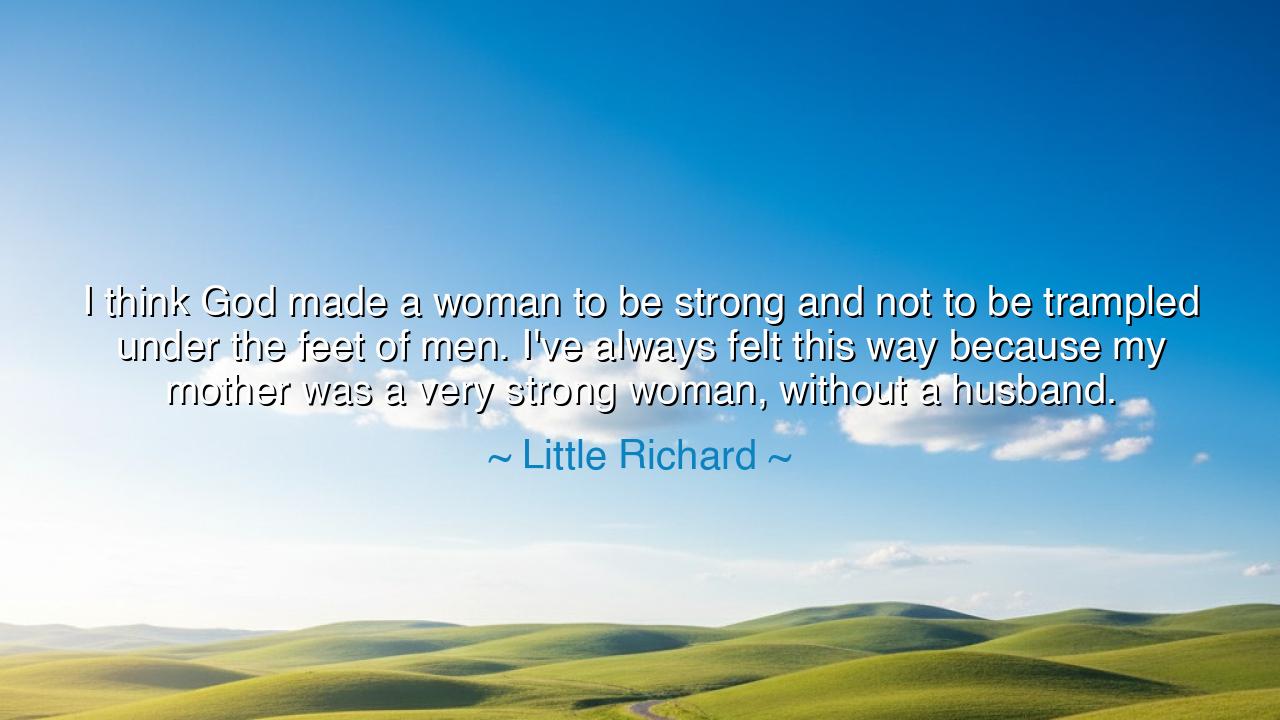
I think God made a woman to be strong and not to be trampled
I think God made a woman to be strong and not to be trampled under the feet of men. I've always felt this way because my mother was a very strong woman, without a husband.






When Little Richard declared, “I think God made a woman to be strong and not to be trampled under the feet of men. I've always felt this way because my mother was a very strong woman, without a husband,” he gave voice to a truth both ancient and divine. His words remind us that strength is not the sole inheritance of men, but a sacred gift bestowed upon women, who were never meant to bow beneath the heel of oppression.
The ancients themselves honored this truth, though often in whispers. In the myths of old, the goddess Athena stood as a pillar of wisdom and war, unyielding in battle and unbent by the wills of men. She was the protector of cities, the guide of heroes, the embodiment of resilience. So too did Little Richard, through his own lived witness, proclaim that women are not fragile ornaments but forces of endurance and might.
His testimony was born of life, not myth. His mother, widowed and alone, became the foundation of his strength. Without a husband beside her, she raised her children with unwavering resolve, embodying the very truth her son would later speak: that women are endowed with fortitude sufficient to weather storms and carve out survival where others might falter. Her life was the scripture he read, her strength the sermon he carried.
History gives us countless echoes of such women. Consider Harriet Tubman, who escaped the chains of slavery only to return, time and again, to guide others to freedom. Without the protection of a husband, without wealth or station, she became a deliverer of her people, a living testament to the strength God wove into the soul of woman. Her story, like that of Little Richard’s mother, proves that the measure of a woman is not in her dependence but in her courage.
Thus, let this truth be passed down: a woman’s strength is no accident of circumstance but a divine ordination. She was never made to be crushed beneath the weight of men, but to walk beside them in dignity, to stand unshaken in the trials of life, and to build where others might break. The witness of mothers, warriors, and leaders through the ages cries out with one voice: women are strong, and blessed is the world that honors their strength.






HNDinh Hoang Nam
Little Richard’s respect for his mother’s strength is touching and speaks to the unspoken strength many women have to show, especially in difficult circumstances. However, I wonder if there’s an implication that women must always remain strong, even in challenging times. Can we start to redefine strength for women not just as enduring, but as being able to ask for help and receive support when needed? Strength doesn’t always have to come from being alone or self-reliant.
PNnguyen phuong ngan
This quote made me think about the role of women in society, especially in challenging situations. Little Richard seems to be elevating women who are not defined by the absence of a partner, which is important. However, I also question the idea that women must always be strong. Is it fair to expect them to shoulder so much on their own? How do we balance this strength with the need for empathy, partnership, and care from others, especially men?
18Nguyen Tu Hoang PH 1 9 8 1 8
Little Richard’s statement is powerful and challenges traditional gender norms. It celebrates the strength of women, especially single mothers, who often have to be both nurturers and providers. I wonder, though, how society’s perception of strength affects women’s emotional lives. Are women expected to always be strong, even in vulnerable moments, and how can we change that narrative to ensure they have the space to be both strong and vulnerable?
KLTran Hoang Khanh Linh
I appreciate Little Richard's view on women’s strength, especially given his personal experience with his mother. It’s empowering to hear a man acknowledge the strength of women, particularly when society has often downplayed or overlooked that strength. But I also wonder: do we sometimes romanticize the idea of women being 'strong' and overlook the importance of mutual support and partnership in relationships? Can we encourage women to embrace their strength while also recognizing their need for love and support?
NTThao Nguyen Thi
This quote highlights an important point about women's strength, but it also raises a question about the expectations placed on women to be strong in the face of challenges. Little Richard's admiration for his mother, a strong woman without a husband, is moving, but does this suggest that women must be strong all the time? Can we create a world where women don’t feel they have to prove their strength in the face of societal expectations?